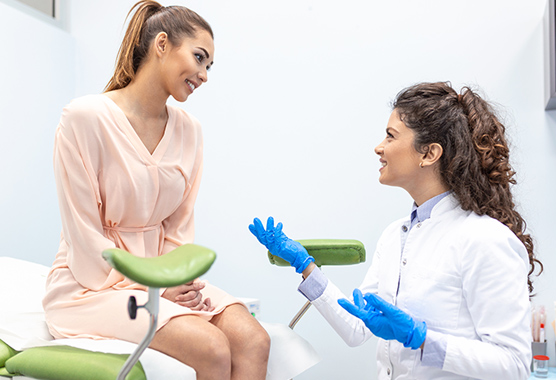Ovarian Conditions
UC Davis Health experts diagnose and treat the many ovarian conditions that can impact your well-being. You receive care to help you start feeling better sooner.
Medically reviewed on Aug. 02, 2023.

What Are Ovarian Issues?
The ovaries are pelvic organs in women. In addition to producing and storing eggs, they make sex hormones, such as estrogen and progesterone.
Common conditions affecting your ovaries include growths (cancer, cysts and abscesses) and hormone imbalances. Rare but severe issues such as torsion occur when ovarian tissue gets tangled in nearby support structures.
UC Davis Health Department of Obstetrics and Gynecology (OB-GYN) delivers exceptional ovarian issue care that draws patients from across the region. We frequently treat difficult-to-diagnose conditions, such as polycystic ovarian syndrome (PCOS). You have access to sophisticated treatments, such as robot-assisted surgery and fertility-sparing techniques.
Ovarian Disorder Symptoms
Ovarian disorders often cause discomfort and bothersome symptoms that complicate daily life. However, you should seek immediate medical attention if you have severe pain.
Common Symptoms
Ovarian conditions may cause:
- Acne
- Bloating and heaviness in your abdomen
- Excessive hair on your face or body
- Feeling full after eating small portions of food
- Irregular menstrual cycle
- Pelvic pain
- Unexpected weight gain
Emergency Symptoms
Seek immediate treatment for symptoms of ovarian torsion, which include:
- Nausea and vomiting
- Severe pain in your pelvis that may radiate down your back or legs
Causes and Risk Factors of Ovarian Disorders
Researchers aren’t sure why some conditions, like PCOS, occur. With others, there is a clear cause.
Hormone Imbalances
Too much or not enough of certain hormones can prevent an ovary from releasing an egg, causing a cyst to form.
Using Tobacco
Smoking causes inflammation and hormone changes that worsen the symptoms of some ovarian conditions.
Other Ovarian Disorders
A cyst can push an ovary out of its natural position into nearby ligaments leading to torsion.
Ovarian Issue Risk Factors
There are certain factors that can increase your risk for certain ovarian issues, such as:
Fertility Treatment and Pregnancy
Fertility drugs, like gonadotropins, and pregnancy cause hormone fluctuations affecting ovarian tissue.
Genetics
Certain gene mutations that are passed down in families raise ovarian cancer risk.
Having Obesity
Being overweight and having problems that often come with it, like insulin resistance, raises your risk of issues such as PCOS.
Diagnosing Ovarian Disorders
UC Davis Health has the expertise and tests you need for a prompt, accurate diagnosis. We carefully consider the potential causes of your symptoms and perform a thorough evaluation. Our experience treating a high volume of rare and complex ovarian conditions helps us detect signs that can be easily missed.
Assessments often include a pelvic exam and blood tests to check hormone levels and rule out other conditions with similar symptoms. We also use imaging tests, like ultrasounds, to look at ovarian tissue and check for growths. Transvaginal ultrasound, which captures images from inside your vagina, is available on-site in many locations.
Ovarian Condition Treatments at UC Davis Health
We deliver more of the services you need in one program and locations close to home. Our conservative approach helps us successfully treat many ovarian disorders using lifestyle changes and medications. When surgery is necessary, you can breathe a little easier knowing you are in expert hands. We use the latest techniques and maintain excellent outcomes.
Lifestyle Changes
Losing weight and quitting smoking can slow ovarian disorder progression and help you get more out of other treatments.
Hormonal Contraceptives
For conditions affecting your menstrual cycle, you may benefit from hormonal contraceptives. We offer a variety of options, including pills, patches and vaginal rings.
Additional Medications
Other medications may be necessary to manage specific symptoms. These include acne treatments, pills and creams to slow hair growth and diabetes drugs to lower insulin levels.
Surgery
You may need surgery to remove a cyst, cancer or other growth or repair torsion. We excel in gynecologic robotic surgery, which uses small incisions and helps you recover quickly.
Preventing Ovarian Conditions
It’s difficult to prevent ovarian cysts, torsion or cancer. But you may be able to avoid (PCOS) by maintaining a healthy weight, exercising and avoiding tobacco.
How likely is hospital care for an ovarian cyst?
4%Of women need to be admitted to the hospital
How common is PCOS?
5-10%Of women of reproductive age experience it
Sources: NIH National Library of Medicine: Ovarian Cyst
UC Davis Health: Polycystic Ovarian Syndrome
Request an Appointment
As Sacramento's No. 1 hospital, you'll benefit from unique advantages in primary care and specialty care. This includes prevention, diagnosis and treatment options from experts in 150 specialties.
Referring Physicians
To refer a patient, submit an electronic referral form or call.
800-4-UCDAVIS
Patients
Call to make an appointment.
Consumer Resource Center
800-2-UCDAVIS

Ranked among the nation’s best hospitals
A U.S. News & World Report best hospital in cardiology, heart & vascular surgery, diabetes & endocrinology, ENT, geriatrics, neurology & neurosurgery, and pulmonology & lung surgery.

Ranked among the nation’s best children’s hospitals
U.S. News & World Report ranked UC Davis Children’s Hospital among the best in pediatric nephrology, orthopedics*, and pulmonology & lung surgery. (*Together with Shriners Children’s Northern California)

Ranked Sacramento’s #1 hospital
Ranked Sacramento’s #1 hospital by U.S. News, and high-performing in aortic valve surgery, back surgery (spinal fusion), COPD, colon cancer surgery, diabetes, gynecological cancer surgery, heart arrhythmia, heart failure, kidney failure, leukemia, lymphoma & myeloma, lung cancer surgery, pacemaker implantation, pneumonia, prostate cancer surgery, stroke, TAVR, cancer, orthopedics, gastroenterology & GI surgery, and urology.

The nation’s highest nursing honor
UC Davis Medical Center has received Magnet® recognition, the nation’s highest honor for nursing excellence.

World-class cancer care
One of ~59 U.S. cancer centers designated “comprehensive” by the National Cancer Institute.

A leader in health care equality
For the 13th consecutive year, UC Davis Medical Center has been recognized as an LGBTQ+ Healthcare Equality Leader by the educational arm of America’s largest civil rights organization.

